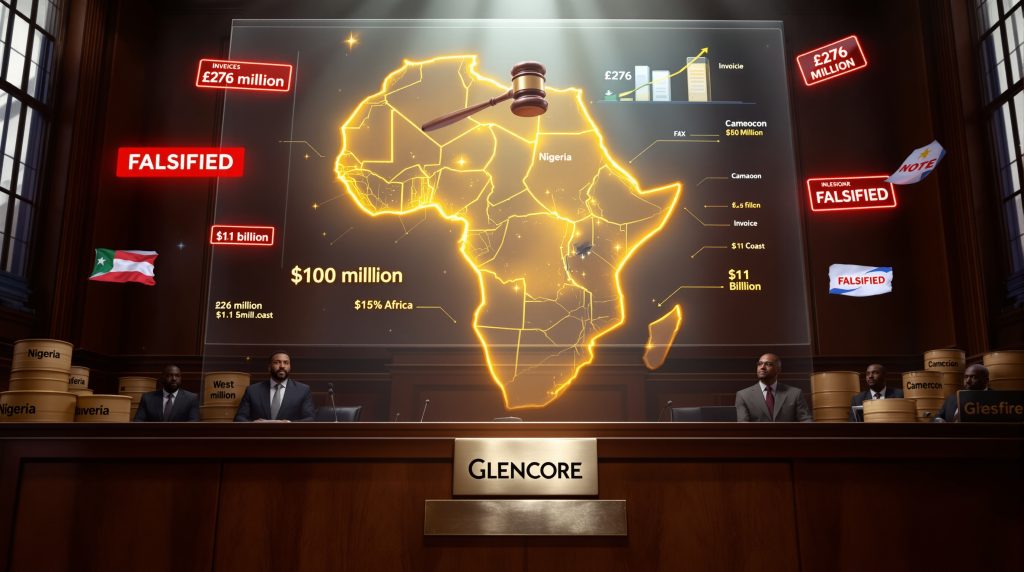Recent Legal Developments in West African Corruption Case
Six former Glencore employees now face serious Glencore Africa bribery charges stemming from alleged bribery operations across West Africa between 2007 and 2014. The Serious Fraud Office prosecution represents one of the most significant corporate corruption cases in recent UK legal history, with defendants accused of systematically corrupting government officials and state-owned enterprise executives to secure lucrative oil contracts.
Four defendants appeared at Southwark Crown Court in November 2025, entering not guilty pleas to all charges. Martin Wakefield and David Perez face additional conspiracy charges related to invoice falsification, suggesting sophisticated methods were employed to disguise corrupt transactions. The remaining two defendants, including Alexander Beard, the billionaire former head of Glencore's oil division, are scheduled to enter pleas at a later date.
The geographic scope of the alleged corruption spans three West African nations where state-owned oil companies control significant market access. Nigeria, Cameroon, and Ivory Coast represent key markets where corrupt payments allegedly secured competitive advantages for Glencore's operations over seven years of systematic misconduct.
Financial Scale of Corrupt Payments and Penalties
The monetary dimensions of this corruption scandal exceed $1.3 billion in combined penalties and corrupt payments. Financial authorities across multiple jurisdictions have imposed substantial fines, reflecting the serious nature of the alleged misconduct and its impact on legitimate business competition.
| Payment Category | Amount | Jurisdiction |
|---|---|---|
| Total bribes allegedly paid | Over $100 million | West Africa (2007-2014) |
| UK regulatory fine | £276 million | Serious Fraud Office (2022) |
| US and Brazil settlements | Approximately $1.1 billion | Multiple agencies |
| Combined exposure | $1.376+ billion | Global enforcement |
The scale of corrupt payments demonstrates how systematic bribery can generate substantial competitive advantages in resource-rich African markets. Over $100 million in illicit payments allegedly secured oil contracts worth significantly more, creating unfair advantages over competitors who operated within legal boundaries.
Furthermore, Glencore's financial penalties represent coordinated enforcement action across three continents. The £276 million UK fine specifically addressed billions in fines for corruption and African payment schemes, while the $1.1 billion in US and Brazilian settlements covered related corruption activities. This multi-jurisdictional approach reflects growing international cooperation in combating corporate bribery.
The timeline of financial consequences spans several years, with Glencore paying substantial penalties in 2022 while criminal prosecutions of individual executives continue through 2025 and beyond. This dual approach of corporate and individual accountability represents evolving enforcement strategies in complex corruption cases. Moreover, understanding investment red flags becomes crucial when evaluating companies facing such legal challenges.
Current Legal Proceedings and Timeline
The UK Serious Fraud Office prosecution follows a carefully structured timeline leading to trial in October 2027. Four defendants have formally entered not guilty pleas, while two senior executives await scheduling for their plea hearings at Southwark Crown Court.
Key dates in the prosecution timeline:
• November 2025: Martin Wakefield, David Perez, Paul Hopkirk, and Ramon Labiaga plead not guilty to all charges
• Future date: Andrew Gibson and Alexander Beard scheduled to enter pleas
• October 2027: Trial scheduled to commence at Southwark Crown Court
• Duration: Multi-year investigation preceding criminal charges
The charges reflect sophisticated allegations of conspiracy to corrupt government officials and falsify documentation. Wakefield and Perez face additional invoice falsification charges for the 2007-2011 period, suggesting prosecutors have evidence of systematic attempts to disguise corrupt transactions through manipulated financial records.
Alexander Beard represents the most senior executive charged in the case. His billionaire status, achieved when Glencore listed on the London Stock Exchange in 2011, underscores the high-profile nature of these prosecutions. However, Beard's departure from Glencore in 2019 preceded the criminal charges by several years, indicating the extended timeline of regulatory investigations.
In addition, international coordination characterises this prosecution, with UK authorities building upon previous settlements in the United States and Brazil. The Serious Fraud Office's multi-year investigation demonstrates the complexity of gathering evidence across multiple African jurisdictions whilst coordinating with former Glencore employees in court and international law enforcement agencies.
Operational Structure of Alleged Corruption Scheme
The criminal charges provide insight into how sophisticated bribery operations allegedly functioned within a major commodity trading company. Invoice falsification charges against two defendants suggest a dual-layer system designed to create documentation trails whilst concealing the true nature of corrupt payments.
Alleged operational elements include:
• Documentation manipulation: Conspiracy to falsify invoices between 2007-2011
• Payment coordination: Systematic corrupt payments to government officials
• Geographic targeting: Focused operations in Nigeria, Cameroon, and Ivory Coast
• Timeline consistency: Seven-year operation spanning 2007-2014
The targeting of state-owned oil companies represents a strategic approach to markets where government control determines contract access. In many African petroleum sectors, state-owned enterprises control exploration rights, production licences, and export permissions, making government relationships crucial for international traders.
Conspiracy charges indicate coordinated efforts among multiple Glencore employees rather than isolated incidents. The involvement of six individuals across different operational levels suggests systematic corruption rather than individual misconduct, potentially explaining the substantial penalties imposed on the company itself.
Consequently, the seven-year timeline coincides with a period of significant growth in African oil production and international commodity trading. This context helps explain both the motivation for corrupt practices and the substantial revenues at stake in securing long-term contract relationships with state-owned enterprises.
Industry-Wide Implications for Commodity Trading
The Glencore Africa bribery charges represent broader challenges facing international commodity traders operating in resource-rich developing nations. The prosecution highlights tensions between competitive pressures and compliance requirements in markets where government relationships significantly influence business outcomes.
Regulatory authorities worldwide have strengthened anti-corruption enforcement following high-profile cases like this one. Enhanced due diligence requirements now apply to companies operating in high-risk jurisdictions, with particular scrutiny of payments to government officials or state-owned enterprises.
Evolving compliance landscape includes:
• Increased transparency requirements in contract bidding processes
• Enhanced monitoring of third-party intermediaries and consultants
• Strengthened internal controls for operations in high-risk countries
• Cross-border information sharing between regulatory agencies
The commodity trading sector faces particular vulnerabilities due to its reliance on government relationships in resource-rich nations. Unlike manufactured goods, natural resources require government permissions for extraction, processing, and export, creating multiple opportunities for corrupt relationships to develop. Understanding mining permitting basics becomes essential for companies seeking legitimate operations in these markets.
Furthermore, competitive pressures in commodity trading can incentivise companies to seek advantages through questionable means. When legitimate competitors operate within legal boundaries, companies engaging in bribery can secure contracts at below-market terms, creating unfair advantages that distort entire markets.
The coordination between UK, US, and Brazilian authorities demonstrates how international enforcement has evolved to address globalised corruption schemes. This cooperation makes it increasingly difficult for companies to isolate corrupt activities in specific jurisdictions without facing worldwide consequences.
Impact on Glencore's Corporate Operations
The legal consequences of the African bribery allegations extend far beyond financial penalties, affecting Glencore's operational structure, market relationships, and strategic positioning. The departure of senior executives like Alexander Beard in 2019 preceded formal criminal charges but reflected internal recognition of potential legal exposure.
Corporate restructuring following corruption scandals typically involves comprehensive compliance system overhauls. Companies facing similar challenges often implement enhanced monitoring systems, third-party oversight mechanisms, and strengthened internal controls to prevent future misconduct and demonstrate commitment to legal operations.
Typical organisational changes include:
• Executive leadership transitions following departures or resignations
• Implementation of enhanced compliance training programmes
• Third-party monitoring of high-risk operations
• Upgraded operational oversight systems and internal controls
The financial impact of corruption cases extends beyond direct penalties through increased insurance costs, elevated borrowing expenses, and potential restrictions on contract eligibility. Credit rating agencies typically consider legal exposure and governance failures when assessing corporate creditworthiness.
However, market relationships suffer when companies face corruption allegations, particularly in sectors where reputation influences contract awards. Government entities and international development organisations increasingly consider compliance records when selecting business partners for major projects.
Stock market performance often reflects investor concerns about legal exposure, management credibility, and operational disruptions during extended legal proceedings. The two-year timeline between current plea hearings and the scheduled 2027 trial creates prolonged uncertainty for stakeholders.
Government Response and Regulatory Changes
Recent regulatory developments have significantly strengthened enforcement mechanisms for addressing corporate corruption in international commodity trading. Government authorities have implemented comprehensive reforms targeting companies operating in high-risk jurisdictions, particularly those involving state-owned enterprises.
The Glencore Africa bribery charges coincide with broader governmental initiatives to enhance transparency in resource extraction and trading. For instance, recent executive order enforcement measures have strengthened oversight of international commodity operations.
Moreover, the executive order impact on national security considerations has created additional compliance requirements for companies operating in strategic resource sectors. These developments reflect growing governmental recognition that corruption in commodity trading poses risks beyond financial misconduct.
In addition, evolving trade war effects have heightened scrutiny of international business relationships, particularly in sectors involving critical minerals and energy resources. Companies now face enhanced due diligence requirements when establishing operations in politically sensitive regions.
Lessons for Mining and Trading Companies
The Glencore prosecution offers important insights for companies operating in similar high-risk environments where government relationships significantly influence business outcomes. Effective risk management requires comprehensive understanding of local regulatory environments and systematic compliance monitoring.
Essential risk management practices include:
• Comprehensive country-specific risk assessments before entering new markets
• Regular third-party compliance audits of operations in high-risk jurisdictions
• Clear escalation procedures for suspicious activities or unusual payment requests
• Executive accountability frameworks linking leadership compensation to compliance performance
Due diligence processes must extend beyond initial market entry to include ongoing monitoring of relationships with government officials, state-owned enterprises, and third-party intermediaries. Many corruption schemes develop gradually over time as business relationships deepen and competitive pressures increase.
Training programmes should address specific scenarios common in resource-rich developing nations, including requests for facilitation payments, charitable contributions to politically connected organisations, and employment offers for relatives of government officials. These situations require clear policies and decision-making frameworks.
Documentation standards become crucial in corruption investigations, as prosecutors often rely on internal communications and financial records to establish intent and coordination. Companies should implement record-keeping policies that support legitimate business activities whilst avoiding language that could be misinterpreted in legal proceedings.
Consequently, the international nature of modern enforcement requires compliance systems that address multiple jurisdictions simultaneously. Companies cannot isolate corrupt activities in specific countries without facing consequences in their home markets and other operational territories.
Future Developments and Trial Expectations
The October 2027 trial date provides defendants and prosecutors substantial time for preparation, evidence compilation, and potential plea negotiations. The two-year timeline reflects the complexity of international corruption cases involving multiple defendants, jurisdictions, and years of alleged misconduct.
Serious Fraud Office prosecutions typically involve extensive documentary evidence, witness testimony from multiple countries, and expert analysis of financial transactions. The invoice falsification charges suggest prosecutors possess detailed records of allegedly manipulated transactions and documentation.
Trial preparation elements likely include:
• Evidence compilation from operations across Nigeria, Cameroon, and Ivory Coast
• Witness coordination involving current and former employees, government officials, and third parties
• Financial transaction analysis covering seven years of alleged corrupt activities
• International cooperation with law enforcement agencies in multiple African countries
The pending plea hearings for Alexander Beard and Andrew Gibson could significantly influence case dynamics. Senior executives often possess the most comprehensive knowledge of operational decisions and corporate policies, making their testimony potentially crucial for both prosecution and defence strategies.
Furthermore, potential outcomes range from full acquittals to substantial prison sentences for individual defendants. UK sentencing guidelines for corruption offences consider factors including financial amounts involved, duration of misconduct, and defendants' roles in the conspiracy.
The case represents a significant test of international cooperation in prosecuting corporate corruption. Success could encourage similar prosecutions involving other companies and jurisdictions, whilst challenges could highlight limitations in cross-border evidence gathering and witness coordination.
"This case demonstrates the serious consequences of corporate corruption and the international community's commitment to holding individuals accountable for their actions," noted legal experts following the recent court proceedings.
What are the broader implications for the commodity trading sector?
The Glencore Africa bribery charges signal a fundamental shift in how regulatory authorities approach corporate accountability in international commodity trading. The prosecution establishes precedents for individual criminal liability alongside corporate penalties, creating stronger deterrents for future misconduct.
Corporate accountability in international commodity trading continues evolving as regulatory authorities worldwide strengthen enforcement capabilities and coordination mechanisms. The prosecution represents both the consequences of alleged past misconduct and the changing standards for future operations in resource-rich developing nations.
Looking to Navigate Corruption Risks in Mining Investments?
Discovery Alert's proprietary Discovery IQ model helps investors identify legitimate ASX mineral discoveries whilst avoiding companies facing regulatory scrutiny like those highlighted in major corruption cases. Stay ahead of the market with real-time alerts on transparent, compliance-focused mineral discoveries that offer genuine growth potential without the legal risks that can devastate share prices.




